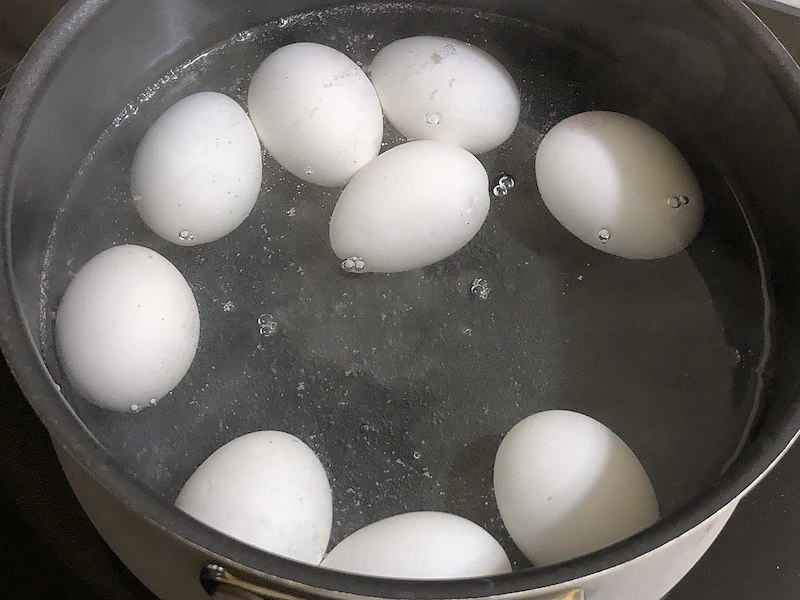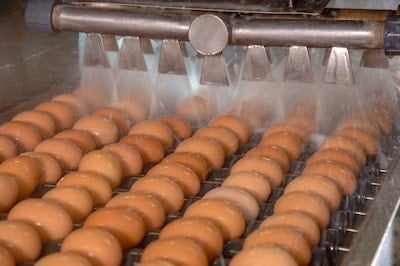Do Boiled Eggs Float?
If you boil eggs often, you may have noticed that some boiled eggs float in water while some do not.
There are a lot of myths and misconceptions about floating eggs, and many people think that eggs that float are rotten or that hard-boiled eggs are supposed to float … so what’s the truth?
What makes some eggs float, and are floating eggs safe to eat?
Raw and whole cooked eggs will float in water when the egg is older. This is because all eggs have a pocket of air inside them, called the air cell.
Over time, the egg loses moisture, and the air cell gets larger. When the air cell inside the shell is large enough, it will make the egg float in water.
So, a floating egg, whether raw or boiled, is a sign that the egg is older, but it may still be perfectly safe to eat. A floating egg is not a sign that it’s bad, fully cooked, or unsafe to eat.
Read on to learn more.
Are Boiled Eggs Supposed to Float?
Boiled eggs are not supposed to float, but floating isn’t a sign that the egg is bad.
Some eggs will float in fresh water while some will sink, and the idea that a boiled egg floats when done is a myth.
There are three reasons that an egg may float while it is boiling. Let’s get into them.
It’s an Old Egg
The shell of an egg is slightly permeable to air, and over time the moisture inside an egg will evaporate, and more air will get inside the shell. Fresh eggs still have a lot of moisture and less air and will sink while boiling. Older eggs will float.
The Shell is Cracked
If you are boiling an egg, and the shell is cracked, some of the egg white will leak out into the water, making the egg weigh less and float.
You’re Cooking it in Saltwater
All eggs will float in heavily salted water. Adding salt to water makes the water denser, and the denser water can support the weight of an egg.
Do Hard Boiled Eggs Float When They are Done?
No, hard-boiled eggs do not float when they are done. Eggs float when they are old due to the enlargement of their air cell, not because they are hard-boiled.
A fresh egg will sink whether it’s raw or boiled, while an older egg might float in both states.
Why is My Boiled Egg Floating?
A boiled egg is probably floating because it is older and not as fresh as eggs that sink.
Older eggs have larger air cells inside of them, which makes them float in fresh water.
However, floating is not a sign that your egg is rotten or unsafe to eat.
Your boiled egg may also be floating because a small crack in the shell allowed some of the egg white to leak out, making the egg lighter in weight.
Can You Eat Eggs that Float?
You can eat eggs that float.
Many people use the “float test” to see how fresh their eggs are, so they can decide how best to prepare them.
Floating eggs are older and not as fresh as eggs that sink, but they are still usually safe to eat.
If an Egg Floats in Cold Water, is it Bad?
An egg that floats in cold water is older than an egg that sinks, but that doesn’t mean the egg is bad.
However, if your egg floats before or during boiling, check it before eating it.
Let’s discuss some things you can do to check if your egg has gone bad.
Inspect the Eggshell Before Purchasing or Using the Eggs
If the eggshell has a crack or dent on it, bacteria may have been able to get inside the egg.
Never buy eggs that are cracked.
If eggs crack after you have bought them as you are bringing them home, immediately break the eggs and empty the whites and yolks into a clean airtight container, and place them in the refrigerator.
Use these eggs within two days.
Note: if an eggshell cracks while boiling the egg, it is still safe to eat.
Crack the Egg Open and Smell It
If you’re boiling eggs, you can boil the egg until it is done, but still, open it and smell it before eating it.
Whether raw or cooked, bad eggs have a distinctive unpleasant smell. Never eat an egg that has a bad smell.
Inspect the Egg White
A fresh egg will have a slightly cloudy or milky egg white, while an older egg will have a clear egg white.
The egg white will also become thinner and more watery over time, while the whites of a fresh egg are thicker and more gel-like.
Egg whites should never be pinkish or greenish in color or have an iridescent quality; if the egg white has a funny color or texture, discard the egg and don’t eat it.
Check the Expiration Date
Egg packaging has an expiration or “use-by” date.
Make sure that you use eggs within the recommended time frame.
Why Do Boiled Eggs Float in Saltwater?
All eggs float in salt water if it is salty enough.
Adding salt to water makes the water denser.
When the water becomes dense enough, it will support the weight of an egg.
Because some people boil eggs in heavily salted water, their eggs are much more likely to float during cooking.
Tips for Choosing the Best Eggs for Boiling
If you are looking for the best eggs for boiling, here are some things to look for or do:
Size
Most standard recipes are written for large eggs, and most instructions for boiling give the timing for large eggs.
Smaller eggs will cook more quickly, while jumbo eggs need to be cooked longer.
Here’s a quick guide to egg sizes so you can adjust your recipes for egg size:
- Small eggs weigh about 1.5 ounces
- Medium eggs weigh about 1.75 ounces
- Large eggs weigh about 2 ounces
- Extra-large eggs weigh about 2.25 ounces
- Jumbo eggs weigh about 2.5 ounces
Age
Older eggs are best for hard boiling and other “hard-cooked” preparation methods like a hard scramble, hard fry, or a folded omelet.
However, fresh eggs should be used when the eggs will be only lightly cooked, as in poaching, soft boiling, or gently heated sauces like hollandaise.
Older eggs are also easier to peel when hard-boiled because the egg’s internal membrane dries out and retracts from the egg white over time.
Bring the Eggs to Room Temperature Before Boiling
Take the eggs out of the refrigerator and allow them to rest on the countertop while you boil the water.
Then add the room-temperature eggs to the boiling water.
Boiling eggs at room temperature helps to prevent the shells from cracking as they cook.
Salt the Water For Boiling Eggs
Some people think that boiling eggs in salt water helps to impart more flavor to the eggs.
While this may be a side effect, it is not the main reason to boil eggs in salt water.
Adding salt to the water increases the water temperature, cooking the eggs more quickly and evenly.
Boiling eggs in salty water also helps to prevent any egg white from leaking out if the shells crack.
Cool the Eggs Quickly
For the best boiled eggs, cool your cooked eggs rapidly and completely.
Then, place cooked eggs in a bowl of ice water and place the bowl in the refrigerator to stop the cooking process and prevent overcooking.
Shocking the eggs in ice water also makes them easier to peel.
Peel the Eggs as Soon as They’ve Cooled
For easy-to-peel hard-boiled eggs, crack and peel them as soon as they have cooled and are comfortable to handle.
Allowing the eggs to sit too long can make them more difficult to peel.
Adding baking soda or vinegar to the water while boiling eggs can also help with making them easier to peel.
In Summary
Now you know whether hard-boiled eggs float, what makes them float, and how to ensure your eggs are safe and healthy to eat even if they are floating.
So, enjoy the best boiled eggs with our helpful tips, and never worry about floating eggs again.







